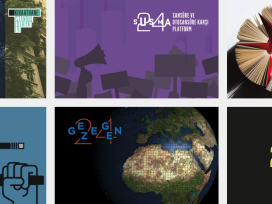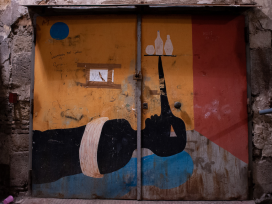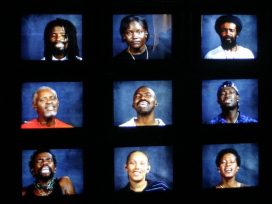Roman Schmidt: Where shall we begin?
Antonin Liehm: In 1945. I was 21 years old and had set up the weekly periodical Kulturni politika (Cultural politics), together with the famous theatre director E.F. Burian. Kulturni politika was a pro-communist cultural magazine, but not a party magazine: ultimately, it was published by the writers’ association. I was a co-founder, yes, but in many ways the baby of the group. At any rate I knew nothing about editing magazines. Fortunately there were Czechoslovak intellectuals around me, on the advisory committee, to show me the ropes. I had meetings with them once a week, and then there were six days to get the magazine ready.
In 1948 I also began working in the press department of the foreign ministry. It was the former foreign minister of Czechoslovakia, Clementis, who found me the job. In 1952 he was hanged in the Stalinist Slansky trial; the years between 1948 and 1956 were difficult overall. As far as my own little story is concerned, I was expelled from the foreign ministry and Kulturni politika ceased publication. In 1956 they took me on a second time, only to dismiss me again four years later. Such was the political state of affairs. But this was the year I came to Litérarní noviny.
RS: Can you explain what role Litérarní noviny played in Czechoslovakia’s intellectual life?
AL: For that we’ll have to trace our steps back a bit further. What you have to know is that before the Second World War there was a great left-liberal daily paper of a clearly intellectual bent: Lidové noviny (The people’s paper). Following the reasoning that the writers’ association only needed one publication, Lidové noviny and Kulturní politika were merged to form a new journal at the end of the 1940s. Thus the writers’ association got one newspaper – but only one, that was the point. The second argument inevitably followed, namely that a writers’ association didn’t need a daily paper. Not even our Russian comrades had a daily paper, just a weekly one in Literaturnaja Gazeta (Literary paper). So Prague got a weekly paper that had the same name as its Russian counterpart, thus, in Czech, Litérarní noviny. The staff was supposed to come from the now defunct Lidové noviny and Kulturní politika – but that never happened.
However, the title remained – as titles always do – and Czechoslovakia finally had in Litérarní noviny a new, strictly Stalinist weekly newspaper. That’s how things stayed till the thaw of 1956. But then, mind you, the paper opened up, there was more room for contemporary art and literature – which meant that when I left the foreign ministry in 1960 I was able to join a substantially different and open Litérarní noviny. Its affiliation to the writers’ association gave it an additional freedom not enjoyed by the party newspapers. In 1960-61 we finally managed to take over the editorial leadership, in a sort of internal revolution: the old editor-in-chief was asked to step down. We could now publish things that no one could have printed since 1948. We exploited our new freedom as far as we possibly could. The circulation soared: it was 130 000 at the beginning of the 1960s. We made politics out of culture, out of theatre, literature and philosophy. People read us as a political newspaper through the medium of culture; a cultural and political review, in the tradition of those periodicals of the 1920s, geared towards the intelligentsia. So that was Litérarní noviny in the 1960s, and I would venture to say that it was a very good paper.
RS: How much sense does it make to relate Litérarní noviny and the later dissident movement to each other?
AL: Here you have to be careful and distinguish between two generations which people in the West often tend to jumble together. The generation of Litérarní noviny was not the generation that later came to be known as the dissidents. Havel and others, the liberals of the 1970s and 80s, had their own small magazine. They knew where they wanted to go. I don’t think the same could be said of us: we only knew what we didn’t want. We were a communist reform movement, not dissidents; that isn’t the right term here. Don’t forget what time we’re talking about: this was the Brezhnev era and a coup was unthinkable.
RS: Forgive me if I generalize a little at this point and ask a question which maybe it is not for me to ask: why does Europe enjoy so little solidarity from eastern European intellectuals who rightly used to complain about the lack of solidarity from western European intellectuals? Shouldn’t these people protest when, as happened with the Iraq war, a new wedge is driven between the regions of Europe?
AL: Look at it this way: what were eastern European intellectuals dreaming of back then? Of Europe. And today? Of America. And yet they know nothing about America, and they know nothing about Europe any more. If you listen carefully you can sense a great insecurity. I think this also has to do with the status of culture: in eastern Europe, culture was extremely important and tangible in public life, while today it has become completely unimportant. Their writers have existential anxieties, with the exception of a few prominent individuals. Their pensions have been cut off and literature doesn’t earn them anything any more. That means you have to take whatever you get offered, but above all: keep your mouth shut.
But I want to come back once more to my generation and our situation at Litérarní noviny. Maybe this can be explained with a story. France at the time of Louis XV and XVI was a model totalitarian state: the people had no rights, the ruling class had all the rights and ideology was overseen by the Church. This was the climate in which, in the middle of the eighteenth century, four people – all members of the ruling class – met at a small bookseller’s and publisher’s. They begin to publish little pamphlets every year on taboo issues, facts, problems… That, and nothing else, is what the great Encyclopédie was: small pamphlets.
RS: A germ cell…
AL: Indeed, and one with a great influence on wider thought, although it was of course subject to strict surveillance in this totalitarian state. Mind you, they had the great fortune that the chief censor, Malesherbes, held his protecting hand over the publication. A magazine needs such allies. In time the Encyclopédie succeeded in penetrating the ruling ideology, infiltrating it and progressively changing it. It destroyed – together with other factors of course – the hegemony of the Church in questions of ideology. And then there were the illegitimate children of these scholarly papers: manifestos and pamphlets which circulated and caused the Enlightenment movement to become political. Diderot, Voltaire, d’Alembert and Holbach were not revolutionaries – in principle they wanted to reform the system and bring about “English conditions” in France. It was only when they were already dead that the political movement formed that culminated in the Revolution.
RS: Litérarní noviny were, so to speak, the Encyclopaedists of Prague ’68?
AL: In a sense, yes. Litérarní noviny, in structural terms, played the role that fell to the Encyclopédie in France. An unusual position in a totalitarian state. What’s more, you have to think of the circulation: 130 000 in such a small country, and the newspaper was sold out every Thursday within two hours. If you get the chance to do that over a number of years, you can consider yourself to have a measure of influence. In this sense, 1968 was only the high point and unfortunately the end of something, not the beginning. In the West people always talk about “Prague ’68”: few talk about how it came about. Incidentally, it initially looked as though our band of reform communists would actually manage it. The board of censors collapsed in the spring of 1968 and they left us their former building for the editorial offices of Litérarní noviny. It was to be converted, under the title of Lidové noviny, into a daily newspaper, and I was appointed to be its editor. We were due to celebrate the move on 15 September. And on 28 October 1968, the Czech national holiday, the first issue of Lidové noviny was to appear. On 21 August, as you know, the tanks of the Red Army rolled into Prague.
RS: You left Czechoslovakia in 1969 and lived at first in Paris. What became of your plans for the journal?
AL: Litérarní noviny achieved cross-border fame – the only problem was that no one could read it, because it was published in Czech. So our idea – mine and friends’ abroad – was to do something like Litérarní noviny elsewhere too. There was nothing comparable anywhere in Europe. We wanted to create a European forum for intellectual debates, following the model of Litérarní noviny. But for one thing I’d lost my language: I could speak German, English and French, but not write them well enough. The other – worse – thing was that we simply couldn’t get any money. On an intellectual level you always have lots of friends as an exile, but economically it’s much more difficult. There wasn’t even enough for me alone. I went to America, was offered a position as a university teacher for a year, and after that I was supposed to receive a post in Paris. I got it thirteen years later, first at the Paris VII [Université Paris Diderot], then at the EHESS [École des hautes études en sciences sociales]. In the intervening years I was in Europe every summer for three or four months. Those who can, do; those who can’t, teach – that’s what they always say in the US. So I taught cinema and “European culture” and nursed the idea for my international magazine.
RS: In the meantime it looked as though it would work out, with the help of Günter Grass and Heinrich Böll.
AL: Grass and Böll had offered to put together an East-West journal with me. Grass in particular wanted this – Böll was already ill, if I recall correctly. East-West – that didn’t interest me in the slightest, I wanted a truly international magazine. We discussed it and actually came to an agreement. The magazine was going to be called L76. I had suggested the title as a personal memory of the legendary Prague Theatre, “D”, where I had worked as a young man. They changed the name there every season: D37, D38 and so on. So I went back to the United States satisfied and assembled an international advisory committee. At some point I received a letter from the publisher telling me that Grass was of the view that the whole thing was getting too international and not German enough. He thanked me, sent me a hundred dollars for my efforts and invited me to write for the magazine. That was that. You can imagine how furious I was. They kept the title L76, by the way. But it became an everyday, provincial magazine that died peacefully in its sleep.
RS: Was your original concept for L76 already the same as the later one for Lettre internationale?
AL: Indeed. Lettre could have been published years before. I’d known since this L76 business that I was going to do this one day – with or without Grass. Around 1980 raising a little money was no longer an impossibility. You’ve got to realize that some of the eastern European émigré groups were rich – some had lived in exile since the revolution of 1848 and had made their fortunes. It was possible to get a certain amount from them, not much, but some all the same. Then there were several attempts at getting started. In Austria, with Martin Pollack, later the central European correspondent of Der Spiegel, we nearly succeeded. Then I made attempts in Germany and Italy, before I finally got in touch with an old friend in Paris, Paul Noirot. He had a little magazine with no money, called Politique aujourd’hui, whose editorial office consisted of one room with a kitchen. That’s where Lettre was born in 1984, quite simply with what was there. Over all those years there was never enough money to pay writers’ fees. I had to work as a lecturer during the day, but we had a student who was our editorial secretary. She got some money for it. The only ones we paid the standard rate were the translators. From the start the concept of Lettre was to have the texts translated so well that a French reader would think he was reading them in the original. We always had the best translators, but not a cent otherwise.
RS: The first issue appeared in 1984. “Kafka” was on the cover.
AL: Yes; thereby hangs a nice tale. In the Centre Pompidou there was a big Kafka exhibition taking place at the time. We wanted to use its opening to introduce Lettre to the world. What we’d forgotten was that the previous weekend was a long weekend. The print run wasn’t ready on time and the opening took place without Lettre. That’s how it always was with us.
RS: Nevertheless, Lettre existed, with interruptions, in France until the year 2000. Bourdieu’s international magazine project Liber, for example, was considerably more short-lived.
AL: Liber didn’t work because they wanted to produce the same magazine in several countries. That’s impossible. That was never the idea behind Lettre. You have to agree on common principles and then develop an independent journal in every country. In the case of Lettre the common principle was the desire to overcome the intellectual division of Europe, the concept of Europe in general – in a cultural sense of course, I’m not talking about the EU – and also questions of north and south. Besides, we had aesthetic and technical predilections, for instance as regards the essay. But different magazines have to emerge out of this. There’s no other way. We intended to achieve roughly fifty per cent overlap in the texts between the individual editions, in order to ensure that they interrelated in what they were trying to communicate. The rest was to be provided by the editors with their own texts, which could appear in other countries as well. In practice, that was extremely difficult, not least because of the technologies at our disposal for communicating with one another. We had no e-mail, not even fax – all the texts circulated by post. It was terribly expensive and took ages. But there were also arguments as regards content, and the different editions grew apart rather than coming together.
RS: What was the conceptual approach in putting the magazine together?
AL: The core idea of Lettre in this respect was to go hunting for texts, not for themes. If we had a good text, be it in German, American or Russian, we would seek out a setting for it – other texts which revolved around it or commented on it, even if they were by no means explicitly written for the purpose. I don’t seek to deny that this was born out of necessity, since after all we weren’t able to commission any pieces. We had to rely on making a collage, taking a wonderful text as our starting point. When the articles for an issue were complete, we then went looking for poetry, went to museums searching for suitable pictures. Our aim was to generate a play of mirrors around a text.
RS: What characterized these central texts in Lettre?
AL: They had to be able to appear without explanatory footnotes in any context, or at least in European ones. If a text required readers who were inseparable from their background, then it wasn’t an option for Lettre. Or if it had to be rewritten and rewritten until it became a newspaper text that was internationally valid. This is different today – the German edition of Lettre International, for example, doesn’t shy away from footnotes and publishes extremely long texts of an academic bent, for example. It’s a wonderful magazine, but in this form it can’t be made international. It can only be done in Germany. Not in France, not in Italy – nowhere else would texts of this length, put together like this, be bought. Not with a magazine that you can buy at the newsstand. It’s an old dream, but it only works in Germany. In this sense there is no longer a Lettre internationale today, what we have is Lettres nationals. I seriously wonder whether – with the exception of Germany – the kind of global magazine that Lettre was intended to be, with the same raison d’être, is still possible today, in times of global internet communication. I don’t think so. It’s no longer economically possible either.
RS: But as far as its content is concerned, is it still necessary?
AL: The original point of Lettre is a thing of the past, there’s no doubt about that. Lettre‘s legitimation lay in overcoming the Cold War division of Europe into two parts. Frank Berberich, the publisher of the German Lettre, understood this straight away: these days he produces a different magazine. In the German Lettre there are long reports, new topics, academic essays. Maybe this can work, but as I’ve said, only in Germany, and even that’s getting harder. Because the question you’ve fundamentally asked me is about the future of what Edgar Morin calls “la culture cultivée”. Of course, if you’ve got enough money you can produce for your friends a journal with a tiny print run. But that’s not what Lettre was about: the idea was to make it available at the newsstand, and to be good, and to stay good. I don’t think that can happen again. Do you watch Arte? Well, then you know what I mean: the demise of an idea.
But, you know, fundamentally I’m not responsible for the future. My grandmother always said: man is thrown into a world of which he understands nothing whatsoever, and he departs from a world about which he no longer understands anything at all. So better not to ask me about the future!
RS: In that case let me ask a question about the past. There were several historic “forerunners” of Lettre in the history of international journals. I assume you remember the Revue Internationale/Gulliver, which German, French and Italian intellectuals tried, without success, to start at the beginning of the 1960s?
AL: Of course, but you must excuse me, I can’t remember the details any more. When we founded Lettre and even before then, we discussed many things with Hans Magnus Enzensberger. He was also involved in Gulliver, of course. Ultimately our ideas diverged, as you can see from Kursbuch. That’s the way it is: of course you can, on the basis of a group, make an uncompromising magazine. And there’s nothing wrong with that. But an international forum like Lettre works differently. We were convinced that there were texts in Sweden that should be read in Arab countries, and vice versa; that there are texts in Bulgaria that deserve to be known in France, and vice versa. If you take this approach, then that rules out quite a lot of polemic material. Take contemporary Russia: an endlessly complicated matter. If you want to understand anything about it, then you shouldn’t be producing an anti-Putin journal. Putin is what he is. There are a thousand other things to be understood about this country. And as one seeks to do so, there are other authors than Ryklin, just as in Brezhnev’s time there were others apart from Solzhenitsyn. Lettre‘s aim was always to make something like that visible, to work at the picture and to sharpen its focus.
What we’re missing today is a new Marx. Not for his perspective or the big blueprints, but to describe and find names for new things. Il faut nommer les choses. That’s why Frank Berberich and the German Lettre are right to have fought the corner of literary reporting in recent years. We’ve got to learn how to see again.
Roman Schmidt was talking to Antonin Liehm in Paris in December 2006.







